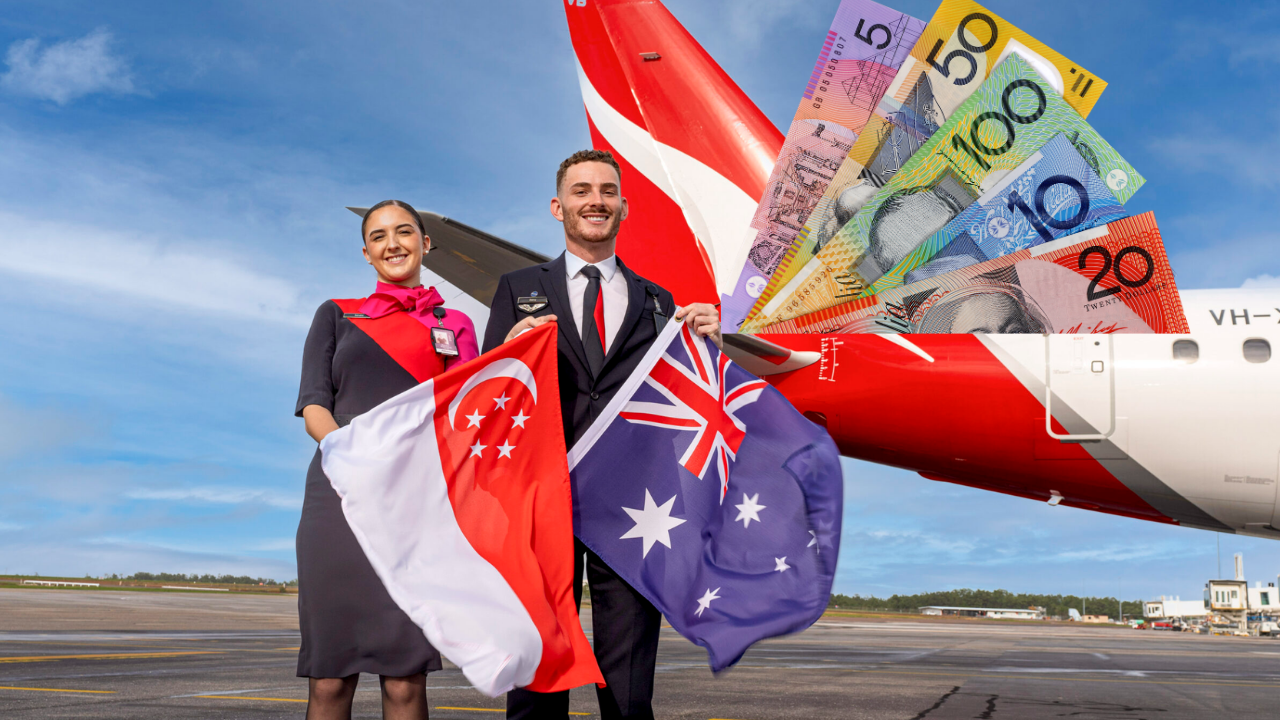Qantas Airways, Australia’s flagship carrier, has long been a symbol of excellence in the aviation industry, renowned for its commitment to quality service and employee welfare. As one of the largest employers in Australian aviation, Qantas employs over 3,000 cabin crew members who serve more than 100 domestic and international destinations. In 2025, Qantas has made headlines with updates to its cabin crew compensation structure, offering total earnings that can exceed AU$100,000 annually for experienced crew members, inclusive of allowances and benefits. This article explores the details of the 2025 salary update, the factors influencing earnings, additional perks, and what this means for current and aspiring cabin crew members.
Qantas Cabin Crew Salary Structure in 2025
Base Salary Range
The base salary for Qantas cabin crew in 2025 varies depending on experience, seniority, and role. According to recent reports, entry-level cabin crew members can expect a base salary ranging from AU$45,000 to AU$60,000 per year. For those with significant experience, base salaries can climb to between AU$70,000 and AU$90,000 annually. These figures align with industry standards for full-service airlines, where seniority plays a critical role in determining pay.
Allowances and Total Earnings
Beyond the base salary, Qantas cabin crew members receive a variety of allowances that significantly boost their total earnings. These include:
-
Meal Allowances: Provided to cover dining expenses during layovers, especially on international routes.
-
Transportation Allowances: To cover ground transport costs at destination cities.
-
Layover Allowances: Additional payments for overnight stays, which vary based on the destination and duration of the layover.
-
Holiday Bonuses: Extra pay for working during public holidays or peak travel periods.
-
Flight Hour Pay: Compensation tied to the number of flight hours, which increases with long-haul international routes or larger aircraft types.
For experienced cabin crew, these allowances can push total annual earnings beyond AU$100,000. Factors such as flight hours, aircraft type (e.g., Airbus A380 or Boeing 787), and operational base (e.g., Sydney or Melbourne) further influence these earnings. For instance, crew members working on long-haul international flights tend to accumulate more flight hours and higher allowances compared to those on domestic routes.
Recent Pay Increases
In a significant move toward pay equity, Qantas recently implemented salary increases for over 700 cabin crew members hired through external agencies. These workers, previously employed under labor-hire agreements, received pay rises of up to AU$20,000 annually under Australia’s “Same Job, Same Pay” legislation, introduced in December 2023. This initiative reflects Qantas’ commitment to fair compensation and addressing disparities in pay for agency-contracted staff. The pay rise ensures that these crew members are now compensated comparably to their directly employed counterparts, further enhancing the attractiveness of a career with Qantas.
Additional Benefits and Perks
Qantas cabin crew members enjoy a range of benefits that complement their financial compensation, making the role highly desirable. These perks not only enhance the overall employment package but also contribute to a rewarding lifestyle.
Corporate Discounts and Partnerships
Through strategic partnerships with leading travel brands, hotel chains, fitness centers, and insurance providers, Qantas offers its cabin crew exclusive discounts. These corporate deals allow employees to access services and products at reduced rates, both in Australia and internationally. For example, crew members can enjoy discounted hotel stays during layovers or reduced rates at partnered fitness centers, enhancing their quality of life both on and off duty.
Travel Privileges
One of the most coveted perks of working as a Qantas cabin crew member is the opportunity to travel the world. Crew members receive heavily discounted or complimentary travel on Qantas’ extensive network, which spans over 100 destinations. This benefit extends to family members and friends in some cases, allowing them to explore global destinations at a fraction of the cost. The ability to visit exotic locations, from New York to Tokyo, is a significant draw for those passionate about travel.
Leave Policies
Qantas provides generous leave policies, including annual leave and compensatory time off for working public holidays. This flexibility allows cabin crew to maintain a healthy work-life balance, which is critical in a role that often involves irregular hours and extended time away from home. The roster system typically offers 12–15 days off per month, depending on flight schedules, providing ample opportunity for rest and personal pursuits.
Career Growth and Training
Qantas invests heavily in the professional development of its cabin crew. The airline operates a state-of-the-art training center in Perth, where crew members undergo rigorous training in safety, customer service, and emergency procedures. Opportunities for career advancement are plentiful, with pathways to senior roles such as cabin crew manager or in-flight supervisor. Additionally, Qantas’ focus on internal growth ensures that crew members can develop new skills and take on leadership roles within the organization.
Factors Influencing Earnings
Several factors determine a cabin crew member’s total earnings at Qantas:
-
Experience and Seniority: As with most airlines, seniority significantly impacts pay. Crew members with over a decade of service are more likely to reach the AU$100,000 earnings threshold due to higher base salaries and access to premium routes.
-
Flight Hours: Long-haul international flights, which often involve overnight layovers, result in higher allowances and flight hour pay compared to shorter domestic routes.
-
Operational Base: Crew based in major hubs like Sydney or Melbourne may have access to more international routes, increasing their earning potential.
-
Aircraft Type: Operating on larger aircraft, such as the Airbus A380, often comes with higher pay due to the complexity and prestige of these routes.
These variables create a dynamic compensation structure where dedication and strategic scheduling can lead to substantial financial rewards.
Industry Context and Qantas’ Position
The aviation industry has faced significant challenges in recent years, including rising operational costs, competition, and disruptions like Cyclone Alfred, which impacted Qantas’ domestic earnings by AU$30 million in 2025. Despite these headwinds, Qantas remains a leader in Australian aviation, bolstered by its fleet renewal program and strategic restructuring. The closure of Jetstar Asia, Qantas’ Singapore-based low-cost subsidiary, in July 2025 freed up AU$500 million in capital, which is being reinvested into fleet upgrades and core operations in Australia and New Zealand. This move underscores Qantas’ focus on strengthening its domestic and international offerings, which directly benefits its cabin crew through job security and enhanced career opportunities.
However, Qantas’ strategic shift has not been without controversy. Pilot unions have expressed concerns over the airline’s move to transfer mainline routes to subsidiaries like Jetstar, where cabin crew and pilots are paid approximately 30% less. This tension highlights the delicate balance Qantas must strike between cost management and maintaining employee satisfaction. The recent pay increases for labor-hire cabin crew demonstrate Qantas’ efforts to address these concerns and align with fair compensation practices.
Comparison with Other Airlines
To understand the competitiveness of Qantas’ cabin crew salaries, it’s helpful to compare them with other airlines in 2025:
-
Virgin Australia: Virgin Australia’s first officers earn AU$180,206 annually, but cabin crew salaries are generally lower than Qantas’, with starting salaries around AU$40,000–AU$50,000. Virgin also offers travel discounts but lacks the extensive international network of Qantas.
-
Emirates: Emirates is recruiting 5,000 cabin crew globally in 2025, with starting salaries around US$32,310 (approx. AU$48,000) plus allowances, totaling about AU$55,000 for entry-level crew. While Emirates offers a tax-free salary in Dubai, Qantas’ higher base pay and extensive benefits make it more attractive for Australian-based crew.
-
Private Jet Cabin Crew: In Australia, private jet cabin crew earn higher salaries than commercial crew, often exceeding AU$100,000 due to the premium nature of their work. However, these roles are less stable and lack the structured benefits of Qantas’ employment package.
Qantas’ combination of competitive salaries, allowances, and lifestyle benefits positions it as a top employer in the aviation industry, particularly for those seeking long-term career stability.
Challenges and Opportunities for Qantas Cabin Crew
While the updated salary structure and benefits are appealing, cabin crew members face challenges inherent to the role. Irregular hours, jet lag, and time away from home are common in the aviation industry. However, Qantas mitigates these challenges through flexible scheduling, generous leave policies, and a supportive work environment. The airline’s investment in employee welfare, such as the new training center in Perth and corporate partnerships, further enhances the employee experience.
For aspiring cabin crew, 2025 presents a unique opportunity to join Qantas. The airline’s focus on fleet renewal and expansion into premium routes suggests continued demand for skilled crew members. Additionally, Qantas’ reputation as a prestigious employer and its extensive global network make it an attractive choice for those seeking a career that combines travel, professional growth, and financial rewards.
Looking Ahead
The 2025 salary update for Qantas cabin crew marks a significant milestone in the airline’s commitment to fair compensation and employee satisfaction. With base salaries ranging from AU$45,000 to AU$90,000, supplemented by allowances that can push total earnings above AU$100,000, Qantas offers one of the most competitive compensation packages in the industry. Coupled with travel privileges, corporate discounts, and robust career development opportunities, a career as a Qantas cabin crew member is both financially rewarding and personally fulfilling. As Qantas continues to navigate industry challenges and invest in its workforce, it remains a beacon of opportunity for aviation professionals in 2025 and beyond.
For those interested in joining Qantas or learning more about its employment benefits, visit the official Qantas careers page for the latest recruitment updates.

